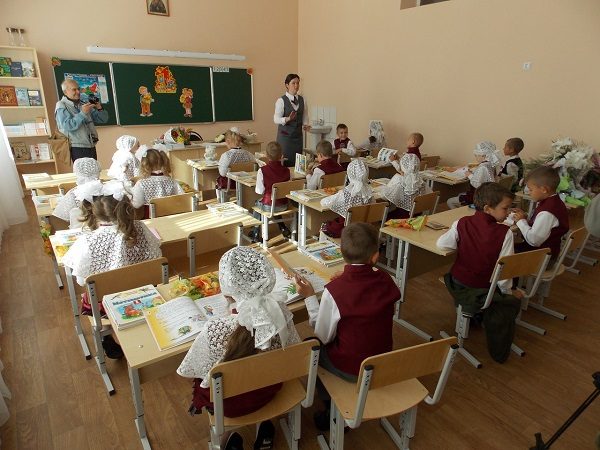The aim of totalitarian education has never been to instill convictions, but to destroy the capacity to form any conviction.
-Hannah Arendt
I’ve been writing a lot about Orthodoxy and education lately. However, I have as yet done little more than to point out the utter travesty which modern public education has become, as well as to emphasize the dire necessity of founding Orthodox schools for our children. Providentially, a friend forwarded me a lecture given recently by Fr. Peter Heers on homeschooling and Orthodoxy, and it got me thinking more deeply about this issue. It’s pure gold; please read (or watch/listen to) the whole thing. Below I will quote some of the most important sections of Fr. Peter’s talk and comment upon them, and then based on his insights I will offer some practical advice as to how Orthodox families might move forward in the immediate future.
THE WAR ON THE FAMILY
One of the first things that Fr. Peter discusses is the total historic abnormality of modern methods of education:
From the time of the 4th century, the Church Fathers’ elementary education — ages seven to fourteen — was done exclusively at home. St. Basil the Great: when do you think he went to school? The great St. Basil, who everybody refers to in terms of classical education and the Christian understanding of it, when do you think he went to school — anybody want to take a guess? About fifteen years old when he actually left the house and went to school. Secondary education was from about fourteen to fifteen on.
So this idea that children need to leave at age five – and now it’s even four, three, to go to a babysitter — is the exception, it’s the innovation. And it’s very dangerous and very problematic for the development of the child to leave his mother and father so early. Kindergarten and day care were entirely unknown during ancient times; the majority of the saints were homeschooled. If you look at the lives of the saints and you pay attention, you’ll see that the idea of state school didn’t exist. Education was done on a tutoring basis, and the norm was much later than it is today.
…So when they talk about “schools,” in the first millennium at least, they didn’t mean universities like we see them today, with massive amounts of people. They meant a teacher or two and a few students. That was the “school” in a lot of places.
When people grow up being raised from the age of five by six different strangers per day, in 55-minute increments, with each stranger’s attention being divided between thirty-five random individuals, when each day they are shuffled from one institutional warehouse room to another, each time being mixed in haphazardly with yet another random group of peers, when they are incessantly being drilled with endless facts and data and information with no cohesive purpose or meaning, all so that they can be assigned some number evaluating their relative performance on a standardized test in order to satisfy faceless bureaucrats in the government, is it any coincidence that so many of them end up feeling isolated, alienated, purposeless, and alone? Especially when half of all Americans will be going home to broken families by the time they reach the age of 18?
And speaking of broken families, is it any coincidence that the disintegration of the family began just after the rise of modern education? Is it any coincidence that the divorce rate skyrocketed precisely during the first era of human history in which children are effectively being raised by the state, rather than by their parents?
Or is it any wonder that there was a mass exodus of women leaving their homes for the workplace just after their five-year-old children began leaving their homes for government schools? And here’s a question that nobody’s asking: who exactly is it that benefits from such an arrangement? Mothers and their children, or Wall Street and the GDP? Because according to the actual data, less than half of American women describe themselves as happy in their jobs. Meanwhile, an absolutely overwhelming 84% of working mothers say that they wish they could be full-time mothers, but can’t afford to. Somehow it seems that “empowerment” and “liberation” have turned out to actually mean “indentured servitude” and “wage slavery.”
To raise godly children is the highest joy, the most beautiful gift, and the most solemn responsibility of any parent, whether man or woman. And the widespread idea that fulfillment and purpose in life come primarily (or even secondarily) from a career, and that the absence of a career is a result of oppression and marginalization, is nothing but a glaring indicator of the vapidity and spiritual poverty of the modern age.
SCHOOLS: A SYSTEM OF CONTROL
But, clearly, I digress. Back to the issue of public education. Fr. Peter discusses the origins of compulsory state schooling in the Reformation (in order to promote the new religious orthodoxies) as well as in the rise of the authoritarian state in Europe (in order to ensure a compliant populace, as well as an industrialized labor force).
So socialization was always at the heart of compulsory state education. When people say, “You need to be in the state schools because you need to be socialized,” they’re right. That’s what the main point of state education is. It’s not about education. Of course, there are people there who really want education in spite of the system, and there are people who are getting educated in spite of the system, but we’re talking about how it began and why it began politically.
In an interesting turn of events, our old friend John Stuart Mill, one of the founding fathers of modernity’s spurious theories of freedom and morality as well as the erstwhile mentor and later arch-nemesis of our hero, Sir James Stephen, took a not exactly sanguine view of the phenomenon of compulsory education by the state:
J. S. Mills said 250 years ago – no friend of Orthodoxy, but he said, “A general state education is a mere contrivance for molding people to be exactly like one another, and in proportion as it is efficient and successful, it establishes a despotism over the mind, leading by a natural tendency to one over the body.” People realized this when this whole movement in the late 1800s for compulsory state education was happening. There were philosophers, there were people in Europe who said “this is not about the interest of the children, this is not about the interest of the parents, this is about the interest of the state, and of forming minds.”
As we have already seen on this blog, and as Fr. Peter mentions also in his talk, the people making these objections were not exactly religious zealots. On the contrary, they were the very people who laid the groundwork for the secular world in which we live today.
Fr. Peter also discusses some of the contemporary legal issues surrounding homeschooling in Europe. Since I live in America and have little experience or knowledge of European affairs, I will not go into detail about those issues. Suffice it to say: it’s really, really bad over there. As in, “Hitler literally wrote the laws on it” bad in Germany, and in many other European states the situation is not much better.
THE PRESERVATION OF THE FAITH
After his overview of the history of public education and the current legality of alternatives to it in the Western world, Fr. Peter gets down to the heart of the matter:
Why am I telling you all this in a talk called “Have Faith?” Well, because it’s not just about you and your child. It’s actually about the survival of the Church, it’s about the survival of Christian identity, it’s about keeping our children pure from an ever-encroaching demonic system of control. And if you see and understand the history of compulsory education, you realize how important it is for us to retain control over the education of the children. It’s a matter not just of education, as I said in the beginning, but of faith and of Christian identity and survival.
And this isn’t just the alarmist ravings a few kooky Orthodox priests on the internet with unrealistic expectations about parenting and the modern world, either. The Baptists are saying exactly the same thing:
This made an impression on me when I was doing research for this: the Baptists, which I guess is the largest Protestant group in America, have been planning and discussing a mass exodus from public schools for some time. And if they understand what’s at stake, and understand the urgency of homeschooling, I think the Orthodox should definitely understand it as well. It says in this document that I found from the Baptists, “As Christians we ought to be planning a Christian education future for our children. Christian parents have a duty to provide their children with a Christian education.” Truly in Scripture it’s very clear, in the Proverbs and elsewhere, that that is one of the main tasks of the parent — not education per se, but formation of the soul of the child. And when we stand before the judgment seat of our Lord, He’s not going to ask us if they got into Harvard or if they were lawyers or doctors. He’s going to ask us if they were faithful and if they had made progress in purification and illumination and deification. And this Baptist document says here, “A few hours at Sunday school and at church will not have a greater influence on the faith and worldview of the child, than forty or fifty hours a week at public school.” So if the Baptists get that, then we should too.
THE PRECEDENT IN ORTHODOXY
As I mentioned last week, quoting Archimandrite Vasileios, the idea of creating Orthodox schools for the sake of preserving the Faith in a hostile culture is absolutely nothing new, and it is absolutely not optional. It was precisely this that allowed Orthodoxy to survive the Turkish Yoke, as Fr. Peter explains:
We’re heading again to the secret schools. Do you know what the secret schools are in Greece? They were in the Turkish period. The Christians had secret schools. They were forbidden to have schools by the Turks. So they went underground; they had schools in the churches or in the homes. The priest, or whoever was educated in the community, in the villages, would teach the children using the liturgical books of the Church.
And the great educator and apostle to Greece, Saint Kosmas Aitolos, said famously when he preached and went around Greece at the end of this period in the 1700’s, he said to them all, “you must educate your children, open up schools if possible, but educate your children”. For the purpose of what?… For the purpose of learning the faith and reading the Scriptures. He did not go around Greece to open up schools so that they might become educated, per se, but so that they might become educated in order to learn the faith. This is where we’re headed. And this is why we have to understand that our role is not to have great ideas for our children’s educational future, but to be focused on the preservation of the faith, just like St. Kosmas was with the Greeks. That’s why we’re educating our children. That’s the role of education in our life. If it’s beneficial and salvific, that’s the end goal of their education — to serve their salvation and to serve the Church.
If the survival of Orthodoxy depended on illegal schools during the period of Ottoman occupation, how much more does the survival of Orthodoxy depend on the establishment of Orthodox schools in the modern world today? The Turks did not constantly inundate Orthodox children with subversive propaganda via the ubiquity of televisions, laptops, smartphones, and social media. Turkish culture and influence could be kept outside of the Christian home.
And while it is perhaps still theoretically possible to preserve our homes from these vehicles of moral and spiritual corruption today, let’s be honest with ourselves: how many of us actually do so? Complete cultural immersion is now a 24/7 phenomenon in virtually all American households, whether they are Orthodox or not.
A WAY FORWARD
Homeschooling is a major part of our struggle to save our children from the hostile environment of contemporary education, and is a place where we create an oasis of Christian formation. Again, as I said, it’s not a personal decision only. It’s an ecclesiastical need. It’s not about better education. It’s about salvation. It’s about survival as we go forward as Christians. And it’s a necessary response to anyone who’s seeking salvation and seeking to be a true Christian, and to raise true Christians. So, it’s imperative for our life, if not for our survival as Orthodox Christians – it’s imperative for our spiritual life. Although we struggle now day to day, and we’re going to struggle, to become better at what we do for our children, always keep in mind that we’re heading into very difficult days, likely of persecution eventually. If we’re going to remain faithful then we need to come back to our children and go deeper… This is the future of Orthodoxy.
Fr. Peter is speaking specifically about homeschooling, and this is probably the place where we need to begin. There are a growing number of Orthodox homeschooling organizations: some examples are the Saint Kosmas Homeschool Community which hosted Fr. Peter’s talk, as well as the Saint Raphael School which offers online courses.
The internet is, however, as always a double-edged sword: it can provide access to invaluable resources for parents and students, but at the same time we must be very careful about relying on screens to teach our children. Fr. Peter says the following on the subject:
When children get exposed at a young age to a computer screen, the addiction that can follow is really destructive for their spiritual life. All around the world… at younger and younger ages, children are getting exposed, and are expected to come to school with their laptop or their tablet, and it becomes a way of life from a very young age. But it’s been shown by a number of studies that this is very destructive, not just for their attention span, but for the development of their minds. So another thing that we need to avoid, that we can avoid, and that we should avoid in home education is the exposure and the addiction of the computer, or the TV screen, or whatever it is that they might be watching.
In my view, the ideal short-term solution is to form homeschooling co-ops based out of our local parishes. This would allow parents to pool their resources, in terms of both time as well as areas of expertise. The immediate financial and administrative burdens — both for parents and for the parish — would be enormously reduced in the case of a homeschooling co-op as opposed to a full-fledged parish school. Yet the foundations for a future parish school would also be laid at the same time.
Even more importantly, these homeschooling co-ops would inherently build community, not just for the children but for their parents and the entire parish as well. This could absolutely involve parishioners without school-aged children; retired parishioners especially could volunteer their knowledge, their experience, and their time. This would serve to strengthen the reality of the parish as the true center of our life, and not simply as the place where Liturgy happens to be served on Sunday. It would be a tremendous step towards the formation of the rich parish life that Orthodoxy in this country so desperately needs.
Moreover, this is also a chance to transcend the jurisdictional differences which have beset the Church in America ever since the tragedy of the Bolshevik Revolution forced Orthodoxy in this country to organize itself along primarily ethnic lines. Cities with multiple parishes of varying jurisdictions can unite together in a single co-op, thus strengthening the Orthodox community in the entire area as well as in each individual parish. Our spiritual and ecclesial unity will thus be made more clearly manifest to us, to our children, and to the wider community. It will be clearer that Orthodoxy is for all Americans, while at the same time leaving each of our ethnic identities intact.
There is one more aspect to all of this which is unpleasant, but nevertheless needs to be said: the state of catechesis in Orthodox parishes in America is often, shall we say, lacking. I don’t want to cast any blame here; the sad reality of overworked and underpaid priests is also one of the most substantial challenges to Orthodoxy in America today. But a homeschool co-op, based out of the parish, would give the local clergy (or even suitable parishioners) an opportunity to catechize both children and their parents on a much more regular basis, and in far greater depth, than is possible at Sunday morning church school alone (although truthfully, even this is not able to be done everywhere as things stand).
To sum up: we are being faced with an urgent crisis, but we are also being given an inspiring opportunity in the Church in America today. This goal of providing our children with an Orthodox education is within our reach, and moreover it is an essential part of our duty as pastors, as parents, and as Orthodox faithful. The Christian world may be crumbling around us, but that only means that the otherworldly Kingdom of Heaven has the opportunity to shine forth all the more brilliantly amidst the darkness that surrounds it.
We have recently experienced Pentecost, the Descent of the Holy Spirit upon the Apostles. We have been given the Great Commission, and we have been granted the grace of the All-Holy Spirit with which to carry it out. Yesterday was the Sunday of All Saints, and we have now embarked upon the fast whereby we struggle to imitate their holy examples and to make that same holiness manifest in our own lives. But we must always remember that we are not only each called to become saints individually, but also to make everyone around us into saints as well.
Where better to start than with our own children, in our own parishes and in our own homes?

















